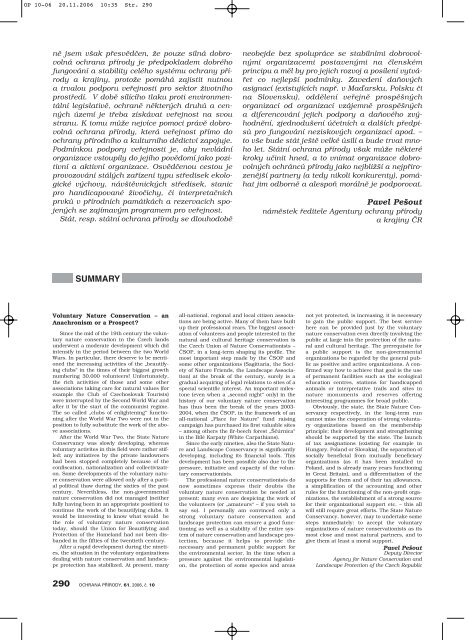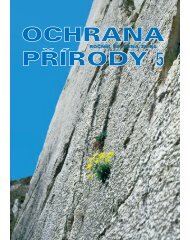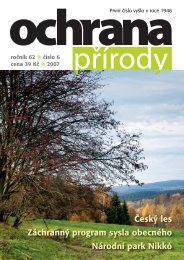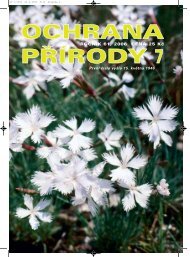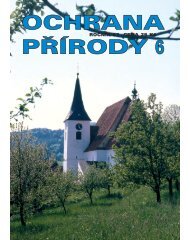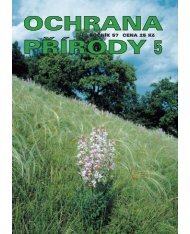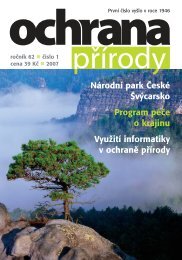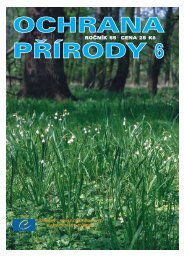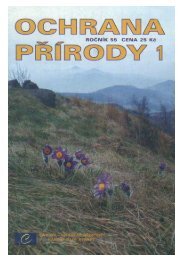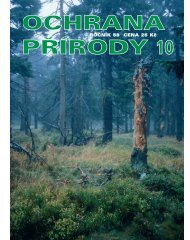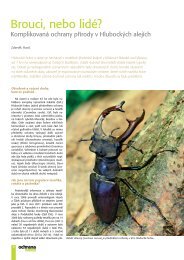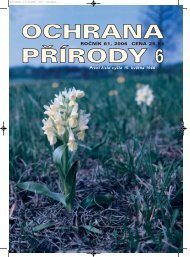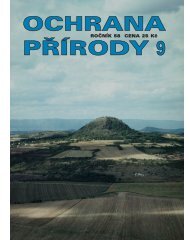OP 10-06 - Äasopis Ochrana pÅÃrody
OP 10-06 - Äasopis Ochrana pÅÃrody
OP 10-06 - Äasopis Ochrana pÅÃrody
Create successful ePaper yourself
Turn your PDF publications into a flip-book with our unique Google optimized e-Paper software.
<strong>OP</strong> <strong>10</strong>-<strong>06</strong> 20.11.20<strong>06</strong> <strong>10</strong>:35 Str. 290<br />
ně jsem však přesvědčen, že pouze silná dobrovolná<br />
ochrana přírody je předpokladem dobrého<br />
fungování a stability celého systému ochrany přírody<br />
a krajiny, protože pomáhá zajistit nutnou<br />
a trvalou podporu veřejnosti pro sektor životního<br />
prostředí. V době sílícího tlaku proti environmentální<br />
legislativě, ochraně některých druhů a cenných<br />
území je třeba získávat veřejnost na svou<br />
stranu. K tomu může nejvíce pomoci právě dobrovolná<br />
ochrana přírody, která veřejnost přímo do<br />
ochrany přírodního a kulturního dědictví zapojuje.<br />
Podmínkou podpory veřejnosti je, aby nevládní<br />
organizace vstoupily do jejího povědomí jako pozitivní<br />
a aktivní organizace. Osvědčenou cestou je<br />
provozování stálých zařízení typu středisek ekologické<br />
výchovy, návštěvnických středisek, stanic<br />
pro handicapované živočichy, či interpretačních<br />
prvků v přírodních památkách a rezervacích spojených<br />
se zajímavým programem pro veřejnost.<br />
Stát, resp. státní ochrana přírody se dlouhodobě<br />
neobejde bez spolupráce se stabilními dobrovolnými<br />
organizacemi postavenými na členském<br />
principu a měl by pro jejich rozvoj a posílení vytvářet<br />
co nejlepší podmínky. Zavedení daňových<br />
asignací (existujících např. v Maďarsku, Polsku či<br />
na Slovensku), oddělení veřejně prospěšných<br />
organizací od organizací vzájemně prospěšných<br />
a diferencování jejich podpory a daňového zvýhodnění,<br />
zjednodušení účetních a dalších předpisů<br />
pro fungování neziskových organizací apod. –<br />
to vše bude stát ještě velké úsilí a bude trvat mnoho<br />
let. Státní ochrana přírody však může některé<br />
kroky učinit hned, a to vnímat organizace dobrovolných<br />
ochránců přírody jako nejbližší a nejpřirozenější<br />
partnery (a tedy nikoli konkurenty), pomáhat<br />
jim odborně a alespoň morálně je podporovat.<br />
Pavel Pešout<br />
náměstek ředitele Agentury ochrany přírody<br />
a krajiny ČR<br />
SUMMARY<br />
Voluntary Nature Conservation – an<br />
Anachronism or a Prospect?<br />
Since the mid of the 19th century the voluntary<br />
nature conservation in the Czech lands<br />
underwent a moderate development which did<br />
intensify in the period between the two World<br />
Wars. In particular, there deserve to be mentioned<br />
the increasing activities of the „beautifying<br />
clubs“ in the times of their biggest growth<br />
numbering 30,000 volunteers! Unfortunately,<br />
the rich activities of those and some other<br />
associations taking care for natural values (for<br />
example the Club of Czechoslovak Tourists)<br />
were interrupted by the Second World War and<br />
after it by the start of the communist regime.<br />
The so called „clubs of enlightening“ functioning<br />
after the World War Two were not in the<br />
position to fully substitute the work of the above<br />
associations.<br />
After the World War Two, the State Nature<br />
Conservancy was slowly developing, whereas<br />
voluntary activites in this field were rather stifled;<br />
any initiatives by the private landowners<br />
had been stopped completely because of the<br />
confiscation, nationalization and collectivization.<br />
Some developments of the voluntary nature<br />
conservation were allowed only after a partial<br />
political thaw during the sixties of the past<br />
century. Neverthless, the non-governmental<br />
nature conservation did not managed (neither<br />
fully having been in an appropriate position) to<br />
continue the work of the beautifying clubs. It<br />
would be interesting to know what would be<br />
the role of voluntary nature conservation<br />
today, should the Union for Beautifying and<br />
Protection of the Homeland had not been disbanded<br />
in the fifties of the twentieth century.<br />
After a rapid development during the nineties,<br />
the situation in the voluntary organizations<br />
dealing with nature conservation and landscape<br />
protection has stabilized. At present, many<br />
all-national, regional and local citizen associations<br />
are being active. Many of them have built<br />
up their professional rears. The biggest association<br />
of volunteers and people interested in the<br />
natural and cultural heritage conservation is<br />
the Czech Union of Nature Conservationists –<br />
ČS<strong>OP</strong>, in a long-term shaping its profile. The<br />
most important step made by the ČS<strong>OP</strong> and<br />
some other organizations (Sagittaria, the Society<br />
of Nature Friends, the Landscape Association)<br />
at the break of the century, surely is a<br />
gradual acquiring of legal relations to sites of a<br />
special scientific interest. An important milestone<br />
(even when a „second night“ only) in the<br />
history of our voluntary nature conservation<br />
has thus been the break of the years 2003-<br />
2004, when the ČS<strong>OP</strong>, in the framework of an<br />
all-national „Place for Nature“ fund raising<br />
campaign has purchased its first valuable sites<br />
– among others the fir-beech forest „Ščúrnica“<br />
in the Bílé Karpaty (White Carpathians).<br />
Since the early nineties, also the State Nature<br />
and Landscape Conservancy is significantly<br />
developing. including its financial tools. This<br />
development has been possible also due to the<br />
pressure, initiative and capacity of the voluntary<br />
conservationists.<br />
The professional nature conservationists do<br />
now sometimes express their doubts the<br />
voluntary nature conservation be needed at<br />
present; many even are despicing the work of<br />
the volunteers (or „amateurs“ – if you wish to<br />
say so). I personally am convinced only a<br />
strong voluntary nature conservation and<br />
landscape protection can ensure a good functioning<br />
as well as a stability of the entire system<br />
of nature conservation and landscape protection,<br />
because it helps to provide the<br />
necessary and permanent public support for<br />
the environmental sector. In the time when a<br />
pressure against the environmental legislation,<br />
the protection of some species and areas<br />
not yet protected, is increasing, it is necessary<br />
to gain the public support. The best service<br />
here can be provided just by the voluntary<br />
nature conservation even directly involving the<br />
public at large into the protection of the natural<br />
and cultural heritage. The prerequisite for<br />
a public support is the non-governmental<br />
organizations be regarded by the general public<br />
as positive and active organizations. A confirmed<br />
way how to achieve that goal is the use<br />
of permanent facilities such as the ecological<br />
education centres, stations for handicapped<br />
animals or interpretative trails and sites in<br />
nature monuments and reserves offering<br />
interesting programmes for broad public.<br />
Obviously, the state, the State Nature Conservancy<br />
respectively, in the long-term run<br />
cannot miss the cooperation of strong voluntary<br />
organizations based on the membership<br />
principle; their development and strengthening<br />
should be supported by the state. The launch<br />
of tax assignations (existing for example in<br />
Hungary, Poland or Slovakia), the separation of<br />
socially beneficial from mutually beneficiary<br />
organizations (as it has been installed in<br />
Poland, and is already many years functioning<br />
in Great Britain), and a differentiation of the<br />
supports for them and of their tax allowances,<br />
a simplification of the accounting and other<br />
rules for the functioning of the non-profit organizations,<br />
the establishment of a strong source<br />
for their organizational support etc. – this all<br />
will still require great efforts. The State Nature<br />
Conservancy, however, may to undertake some<br />
steps immediately: to accept the voluntary<br />
organizations of nature conservationists as its<br />
most close and most natural partners, and to<br />
give them at least a moral support.<br />
Pavel Pešout<br />
Deputy Director<br />
Agency for Nature Conservation and<br />
Landscape Protection of the Czech Republic<br />
290 OCHRANA PŘÍRODY, 61, 20<strong>06</strong>, č. <strong>10</strong>


